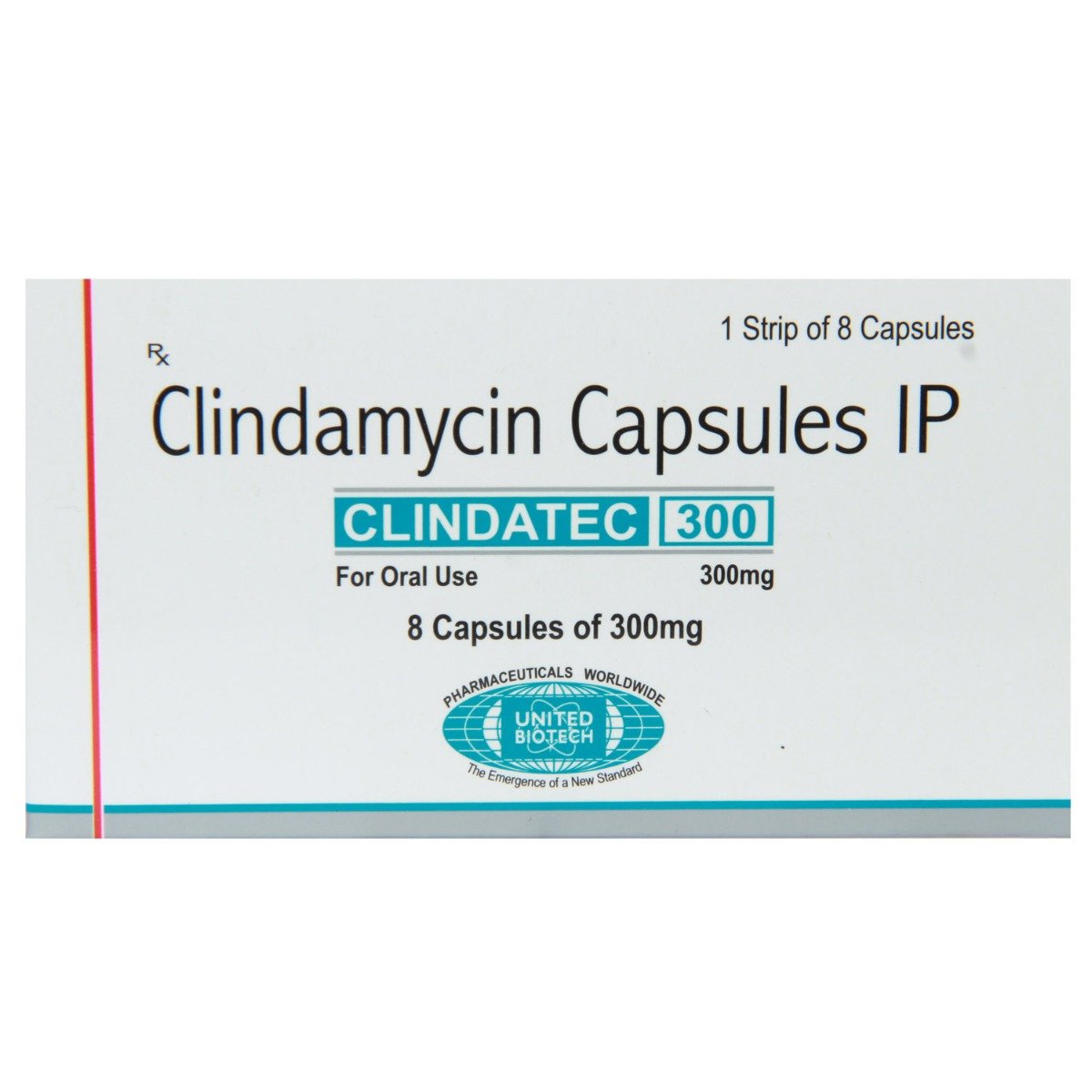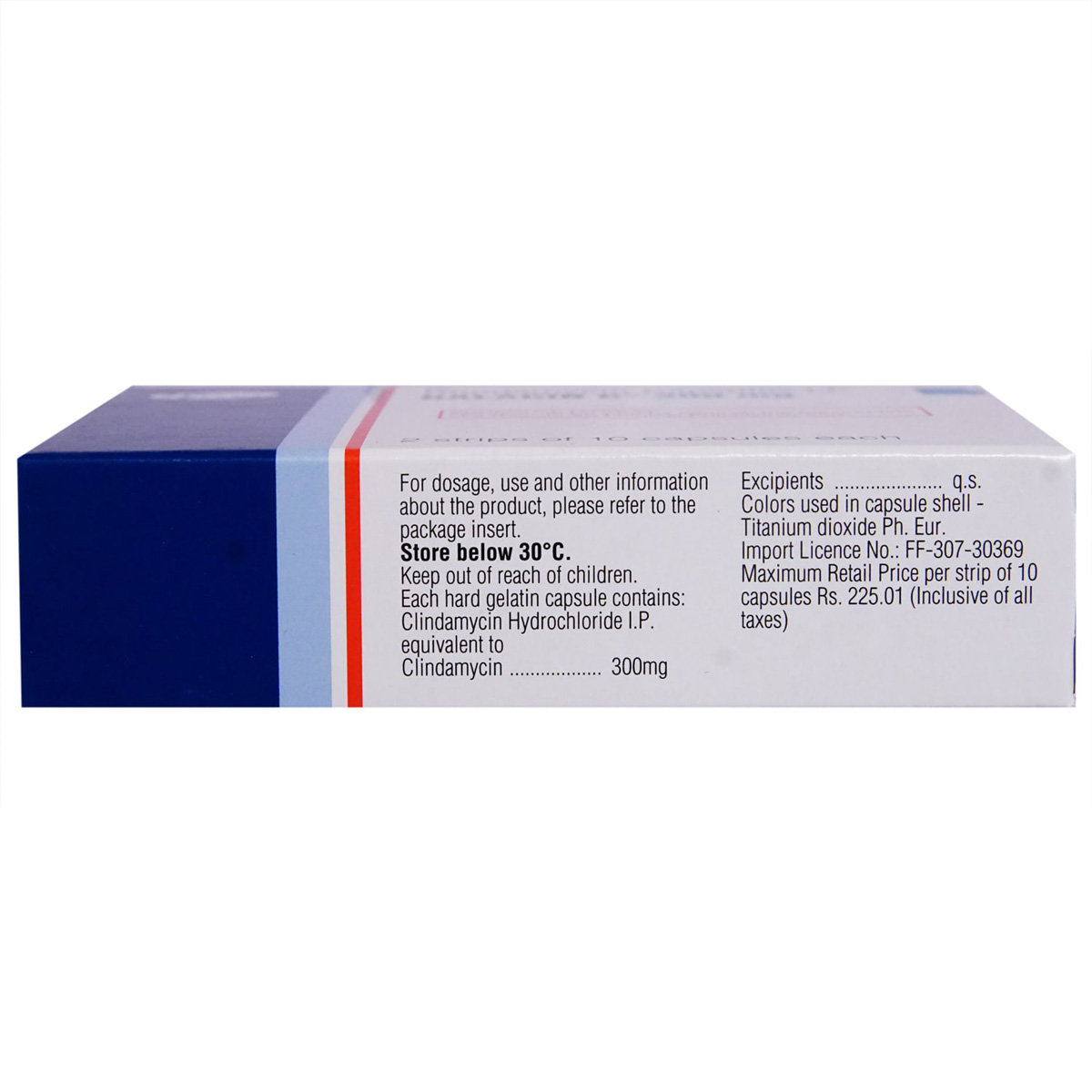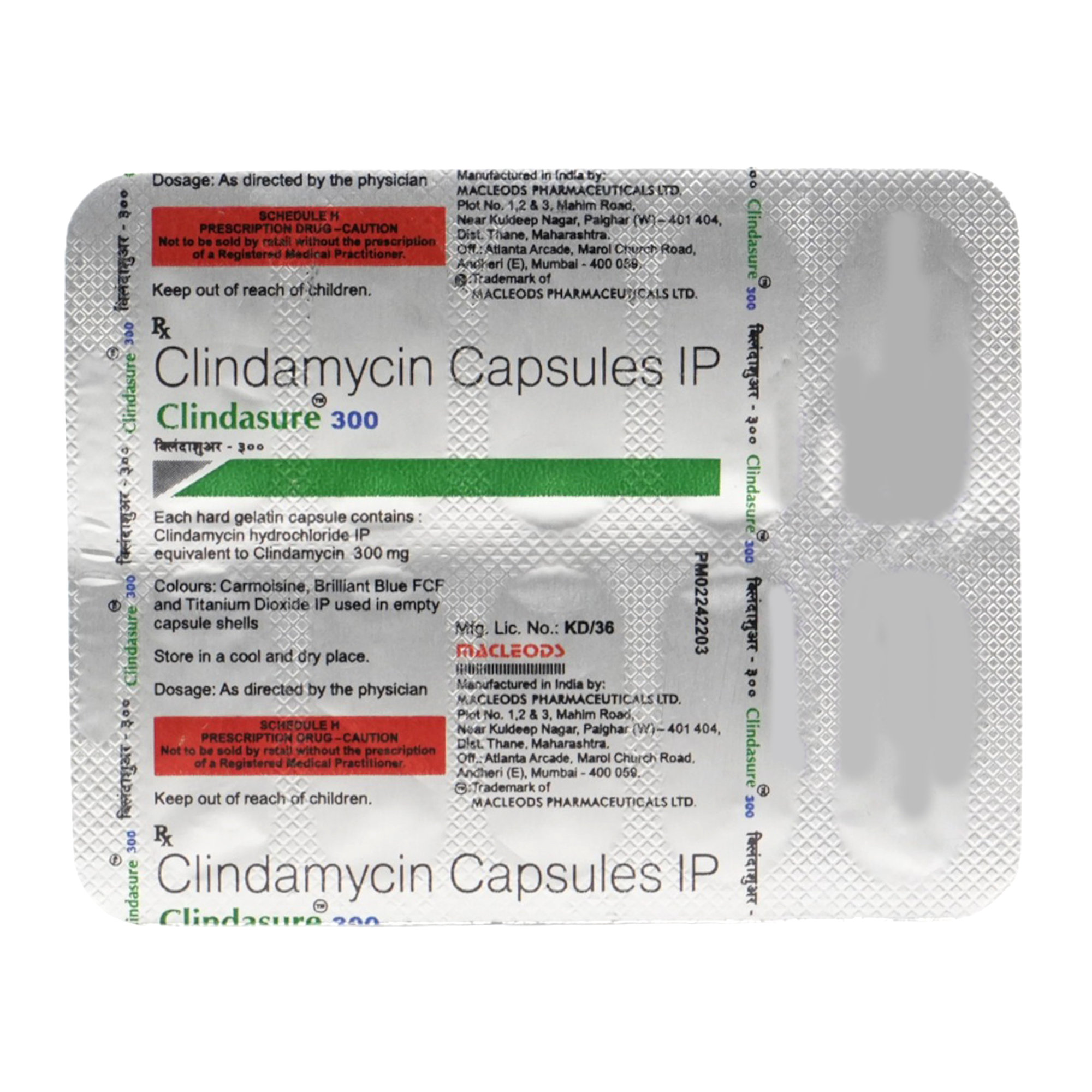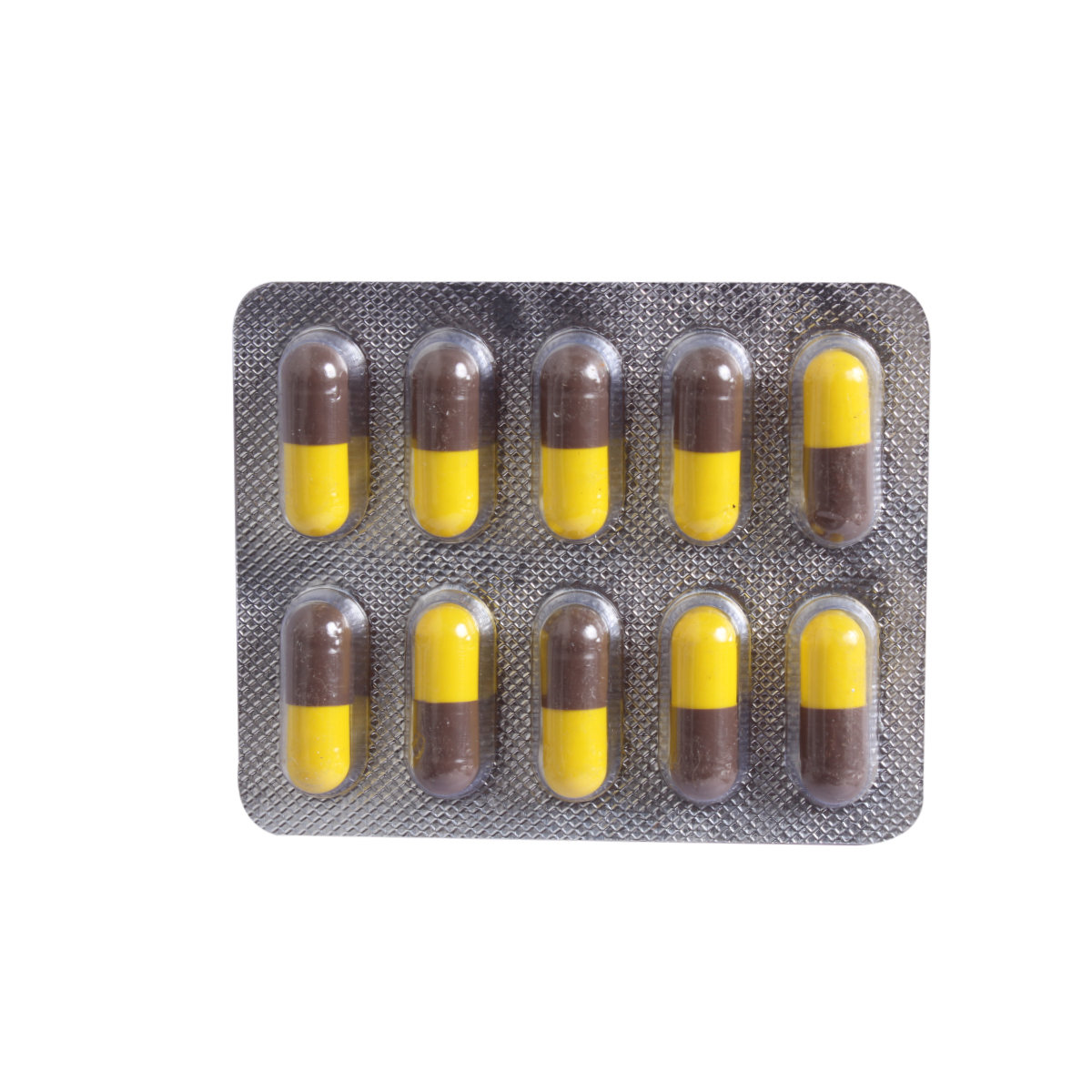Clivin-300 mg Capsule 10's
MRP ₹257
(Inclusive of all Taxes)
₹38.5 Cashback (15%)
Provide Delivery Location
Online payment accepted
 Prescription drug
Prescription drugWhats That
Composition :
Manufacturer/Marketer :
Consume Type :
Expires on or after :
Return Policy :
About Clivin-300 mg Capsule 10's
Clivin-300 mg Capsule 10's belongs to the class of ‘antibiotics’, primarily used to treat bacterial infections. Bacterial infection occurs when harmful bacteria grow in the body and causes illness. It can infect any part of the body and multiply very quickly. Clivin-300 mg Capsule 10's will not work for viral infections, such as common cold and flu.
Clivin-300 mg Capsule 10's contains 'Clindamycin' that works by preventing bacterial protein synthesis, leading to the inhibition of bacterial growth. It shows a bacteriostatic effect that stops bacterial reproduction. Clivin-300 mg Capsule 10's effectively treats infections caused by gram-positive and anaerobic (living without air) bacteria, including susceptible strains of Staphylococcus aureus, Streptococcus pneumoniae, and Clostridium perfringens.
Take Clivin-300 mg Capsule 10's as advised by a doctor. Clivin-300 mg Capsule 10's may cause side effects, although not everybody gets them. Common side effects of Clivin-300 mg Capsule 10's include stomach pain, nausea, vomiting, diarrhoea, heartburn, skin rash, and vaginal itching or discharge. Most of these side effects do not require medical attention and gradually resolve over time. If these side effects persist longer, please consult your doctor.
Inform the doctor if you are allergic to any of the components in Clivin-300 mg Capsule 10's. Let your doctor know if you have any liver disease, kidney disease, gastrointestinal diseases (colitis, an inflammation of the colon), yellow food dye allergy, and allergic conditions (asthma, hay fever, eczema). Do not use Clivin-300 mg Capsule 10's while getting vaccinated with live bacterial vaccines (typhoid vaccine) since Clivin-300 mg Capsule 10's may affect vaccine activity. Clivin-300 mg Capsule 10's should be used only with a doctor's advice during pregnancy and breastfeeding.
Uses of Clivin-300 mg Capsule 10's
Directions for Use
Key Benefits
Clivin-300 mg Capsule 10's is an antibiotic that treats bacterial infections. It works by inhibiting bacterial protein synthesis, which inhibits bacterial growth. It shows a bacteriostatic effect, which stops bacterial reproduction but doesn't kill them. Clivin-300 mg Capsule 10's effectively treats infections caused by gram-positive and anaerobic (living without air) bacteria, including susceptible strains of Staphylococcus aureus, Streptococcus pneumoniae, and Clostridium perfringens.
Storage
Drug Warnings
Do not use Clivin-300 mg Capsule 10's if you are allergic to any of its components. Let your doctor know if you have any liver or kidney diseases, gastrointestinal diseases (colitis, Clostridium difficile-associated diarrhoea), yellow food dye allergy, and allergic conditions (asthma, hay fever, eczema). Do not use Clivin-300 mg Capsule 10's while getting vaccinated with live bacterial vaccines (typhoid vaccine) since Clivin-300 mg Capsule 10's may affect vaccine activity. Pregnant and breastfeeding women should consult their doctor before taking Clivin-300 mg Capsule 10's. Clivin-300 mg Capsule 10's should be used in children only when prescribed by a doctor.
Diet & Lifestyle Advise
- Include whole-grain foods like multigrain bread and brown rice in your diet.
- Taking probiotics after an antibiotic treatment reduces the risk of antibiotic-associated diarrhoea.
- Try taking yoghurt, cheese, sauerkraut, and kimchi that help restore the intestine's good bacteria.
- Include more fibre-enriched food in your diet that is easily digested by your gut bacteria. Fibre foods may also help restore healthy gut bacteria after a course of antibiotics.
- Avoid intake of alcoholic beverages as it can make you dehydrated and affect your sleep.
- Manage stress, eat healthily, drink plenty of water, exercise regularly, and get plenty of sleep.
Side Effects of Clivin-300 mg Capsule 10's
- Stomach pain
- Nausea
- Vomiting
- Diarrhoea
- Heartburn
- Skin rash
- Vaginal itching or discharge
Habit Forming
Therapeutic Class
All Substitutes & Brand Comparisons
RX
Out of StockCindam 300mg Capsule
Baxton Pharmacia Pvt Ltd
₹220
(₹19.8 per unit)
14% CHEAPERRX
Out of StockClinivib 300 Capsule
Vibcare Pharma Pvt Ltd
₹220
(₹19.8 per unit)
14% CHEAPERRX
Out of StockClz 300mg Capsule
Fc Remedies
₹220
(₹19.8 per unit)
14% CHEAPER
Author Details
We provide you with authentic, trustworthy and relevant information
FAQs
Drug-Drug Interactions Checker List
- ERYTHROMYCIN
- WARFARIN
- CARBAMAZEPINE
- RIFAMPICIN
- PHENYTOIN
Special Advise
- Liver function monitoring (Liver function tests) is recommended in patients with severe liver disease.
- Clostridium difficile-associated diarrhoea (CDAD) is reported during the usage of antibiotics. Please consult your doctor if you experience prolonged diarrhoea.
- Coagulation (blood clotting) tests are recommended when Clivin-300 mg Capsule 10's is used along with anticoagulants.
Disease/Condition Glossary
Bacterial infection: It occurs when harmful bacteria grow in the body and causes illness. It can infect any part of the body and multiply very quickly. Bacteria may be gram-positive (have a thick cell wall) or gram-negative (do not have a cell wall). Some common symptoms of a bacterial infection include cough, fever, shortness of breath, chills, muscle pain, fatigue, and tiredness. Untreated bacterial infections may lead to serious life-threatening conditions like sepsis.

Have a query?
Alcohol
Safe if prescribed
Avoid taking alcohol while using Clivin-300 mg Capsule 10's since it may worsen the side effects.
Pregnancy
Consult your doctor
Please consult your doctor before taking Clivin-300 mg Capsule 10's if you are pregnant or planning to conceive.
Breast Feeding
Consult your doctor
Clivin-300 mg Capsule 10's is not recommended during breastfeeding since it can be excreted into breast milk. Please consult your doctor before taking Clivin-300 mg Capsule 10's if you are breastfeeding.
Driving
Safe if prescribed
Clivin-300 mg Capsule 10's usually does not interfere with your driving ability.
Liver
Consult your doctor
Let your doctor know if you have any history of liver diseases before taking Clivin-300 mg Capsule 10's since it may cause jaundice and abnormal liver function tests.
Kidney
Consult your doctor
Let your doctor know if you have any history of kidney diseases before taking Clivin-300 mg Capsule 10's.
Children
Safe if prescribed
Clivin-300 mg Capsule 10's should be used in children only when prescribed by a doctor. Your doctor will prescribe the dose depending on the child's age and body weight.













